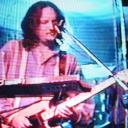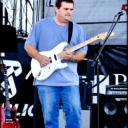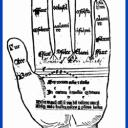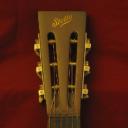Yahoo Answers is shutting down on May 4th, 2021 (Eastern Time) and beginning April 20th, 2021 (Eastern Time) the Yahoo Answers website will be in read-only mode. There will be no changes to other Yahoo properties or services, or your Yahoo account. You can find more information about the Yahoo Answers shutdown and how to download your data on this help page.
Trending News
Why do so many guitar players insist that a guitar NEVER be tuned to anything other than standard tuning?
It's not like alternate tuning is a new thing. Blues players have been using open tunings for slide guitar since the early part of the 20th century.
Tony Iommi detuned his guitar a full 2 steps in the early 70s. And he did it with super light strings, which boggles my mind.
There are examples throughout the existence of the guitar of people tuning them differently.
I can understand trying to steer beginning guitar students away from drop tunings and a bunch of different alternate tunings, because I do so myself. I believe it is important to get the fundamentals down before you start screwing around with alternate tunings.
But what about those players who already know what they are doing, like myself? I mean, I've been honest about my preference for drop tunings, and my reason isn't because I can play power chords with one finger. Do some of you guys think I'm wrong and/or an idiot for tuning my guitar to something other than standard?
Just curious, because I keep running across answers where the person giving advice acts as though tuning a guitar to anything other than standard is a crime against music.
Some of you figured out what I was doing. Kudos on that.
If even one beginning guitarist makes a quick search and finds all these great answers from knowledgeable people in one place, I'll consider my goal to have been reached.
I know why *I* drop tune, and it isn't because it's easier. In fact, it makes some things a lot harder. My reason is I have long enough fingers that I can play a full major or minor triad across just the 3 lowest strings. That gives me the ability to play major and minor chords with a lot of gain that would sound terrible if I played them across 5 or 6 strings (too many harmonics getting jumbled together).
Bar the E and A strings at a given fret and put your pinky on the D string 4 frets away and you're playing a minor chord.
Move your pinky one fret farther and it becomes a major.
Impossible to do in standard tuning, and difficult in a drop tuning unless you have long fingers (which I do).
I've also adapted a lot of my open chords to utilize the open low string. In drop D for example, I'll often let the low D ring while playing G major and D major. It gives it a nice low end warmness that I like.
8 Answers
- Big AlLv 57 years agoFavorite Answer
It's up to you whether you want to use standard tuning or not. Who cares what anyone else thinks or does. My only problem with alternate tunings is forgetting the song I learnt in that tuning because it was the only song I wanted to learn in that tuning. One song is the rain song by led zeppelin. I spent a whole day learning it, played it for a week or so until I wanted to play other stuff in standard tuning then a couple of weeks later went back to play it and forgot how to play parts of it. Standard tuning is just easier. If there was a few songs I liked that had the same tuning as the rain song I could stayed in that tuning and played them all without getting bored. I love playing songs in different tuning especially zeppelin songs but like I said I forget how to play them after spending most of the time in standard tuning. Most of the stuff I play is in standard tuning. Only 10 or so that aren't. Anyone learning should stick to standard tuning until they're ready to experiment.
- Russell ELv 77 years ago
I think this is a great question. You'll notice that every answer is from a heavy hitter in here.
I think that the bullet points have been well documented here and are very valid.
It's not that we think drop tuning or alternate tuning is "bad" per se, but as you said, for beginners it is a very bad idea.
These guys know nothing about the correct notes and if they have a tremolo bridge drop tuning plays hell with it.
Even as a long time guitarist, I would find it very confusing is I just did a simple "dropped D" My muscle memory is pretty well ingrained. I would be constantly messing up on the low E string.
I remember the first time I played a 5 string bass(onstage during a very high class, well paying gig) to give the bass player a rest. I kept going down to the B string instead the E string.
So for a beginner, just learning the dotted fret notes is a challenge. How is a new player ever going to learn
how to play in certain keys if every song they play has the root notes on different frets?
That is MY main objection to it....but as you say, for newbies. If you know what you are doing, then drop tuning to get the "metal" sound is fine. But for those who put on the thicker gauges to drop tune are in for a rude awakening if they actually try to play in Standard.
I seem to see one of the main reasons for alternate tunings is that kids learn all the guitar tricks that use the open strings. A simple lick being the little riff in the Back in Black main riff. That's kinda hard to do if you don't use the open notes, right?
So if the metal guys want to play in B or C or D, they just change the tuning of the guitar so they can play the same fingerings for every key and they are robbing themselves of versatility.
Many of the others and myself are just trying to instill proper knowledge of the instrument BEFORE delving into alternate realms. ( I think Me and Tony B are the most vociferous objectors...)
LOL sounds like a cool song "Meeeeee aaaaand Toneee Beeeeee"
- PatrickMoeLv 47 years ago
Most of the time when I see someone telling someone else not to use non standard tuning, they are talking to people who are beginners and have very little experience playing the guitar.
In that case, I wholeheartedly agree. They should master standard tuning first so that they can better understand chord structure and where to find different notes and get familiar with the neck.
I have nothing against non standard although I rarely use open tuning myself. I really have no desire to do that. If I played slide more, I would probably keep one of my guitars tuned to an open chord.
I do sometimes tune one of my guitars 1/2 or a whole step sharp or flat since I usually play at Church and they have a tendency of re-pitching music and I loathe capos.
If I have to do this, I will use my SG if I have to tune up and use my Tele if I have to tune down since the scales of those two guitars is so different and they still play decent tuned like that. I will then use my Strat as my main tuned to pitch and keep the 2nd on an A/B switch to use for the re-pitched songs.
Even with this, I only tune sharp or flat if there is a required open string drone (common in Contemporary Christian music) or the chords just absolutely have to have the open strings in them.
- DannyLv 77 years ago
Hi, 'C. When I started posting here about three years ago, I was kinda like "those people", pretty quick to knock drop tuning. In context, it generally seems to be sought by some new kid way short of actually knowing how to play, instead looking for some "easy" short-cut way to sound Awesome.
Over time, however, I have learned much from you about the subject, and from some of the other great posters who've answered this question today. (I also have come to look for your responses on Metal Q's as pretty definitive.) So I will endeavor to leave the issue alone, as you da man. It's not easy to teach an old coot like me, but you have, and I thank you for that.
EDIT: Damn, what a read! A few more, and it will be the full gathering of the Tribe, 'C.
I can't but wonder how many noobs will just blow by this whole (great) string. Sigh. Wow.
Source(s): Playing 'standard since 64, now retired short of properly learning drop tuning. - How do you think about the answers? You can sign in to vote the answer.
- MamiankaLv 77 years ago
I am not a guitarist - but have taught music for over 35 years, both in the schools of NY and in my private studio. I am writing in SUPPORT of the great answers about the learning curve of beginners. Some are kids who think that in SHORT ORDER - and by watching YooToob -they can soon outplay the most creative and accomplished guitarists. They do not know how play more than a handful of chords, do not know the capabilities of the guitar in its *native*, basic, standard tuning - and seem to think that if they *go rogue* and start using ( as if they knew how!) some alternative that their IDOL mentioned using - that they, too can "grow up to be him!". I fully support teacher who will tell students to STAY in standard tuning *for now* - or until that student has proficiency. As other experts here said - there are kids who do not know the basics, and thing that "creativity" meaning scorning instruction or fundamental knowledge; master players know that there is a certain chunk you NEED to know - another chunk that is optional, more advanced than you need right now, or a matter of stylistic choice. I tell my students ( I aa flutist) that artists need to draw in black-and-white - with a pencil - before they need to mess around with the Crayola Big Box, or spend $$ on an easel and oils. There are kids who scorn learning to read music - and really do not know the spectrum of tabs or chord symbols, either. They sneer at lessons - but will spend a stupid amount of money on "more guitar than they need" - and that includes amps that will cause car alarms to go off down the street.
So keep the great advice coming, folks - there are tons of kids here who NEED to hear it form you.
Source(s): Professional classical musician. educator/studio teacher/adjudicator working full-time in music in NY since 1973. - ?Lv 77 years ago
I've wondered about that myself. Perhaps open tunings are more of an American thing? They don't seem to have much to do with the classical tradition - it seems likely that Open D and Open G achieved popularity by way of a couple of late 19th/early 20th century parlor guitar tunes ("Siege of Sebastopol" and some sort of proto-"Spanish Fandango") played on American gut-string guitars, after which they became incorporated into black musical traditions. And Hawaiian music had a big influence too. The invention of slide playing made open tunings a necessity. So I can see how people with more background in European musical traditions might view open tunings as less "correct", since they're derived from non-European and largely unwritten traditions, after starting out as an easy novelty for amateur guitarists.
Then too, alternate tunings cause an annoying amount of confusion with beginners. Some of them seem to think it's normal to change tunings depending on the key of the song, and one gathers that the things they see their favorite artists doing don't exactly help to dispel this impression.
- Anonymous7 years ago
You could ask the same question about piano! The thing is, a "normal", "standard" guitar is tuned EADGBE. That is how they are designed and built to be tuned. To me, there are only two reasons to deviate from that:
1/ Because it allows something to be played that would either be impossible or very difficult in standard tuning, because of the limitations of the guitar/tuning NOT because of the limitations of the player! An open tuning is a good example (especially when a slide is being used) and so are DADGAD and dropped D. In fact, probably every alternative or altered tuning used by competent players (all of whom are way better than I am) is fine by me.
2/ Because of a physical disability. Your example of Tony Iommi is a good one. Anything that allows a person to continue to play after an accident or start playing despite a disability is a great thing. But I don't count stupidity as a disability!
I guess that years ago lack of information would be another issue. Apparently when McCartney met Lennon he (Lennon) had his guitar tuned "incorrectly" and had made up his own chord fingerings; apparently Richie Havens had no idea how to tune his first guitar and arrived at an open tuning using his knowledge of singing in church.
The thing is though, the idiots that post questions here don't fit into these categories. They are the same people that don't know how to use a capo, think the truss rod is adjusted to alter the action of a guitar and think that you "learn guitar" by learning "songs" from tablature (or "tabs" as they call it). They think a guitar is tuned according to the song being played and that a chord is named according to where you put your fingers rather than the notes it contains, so the basic nut-position Am chord shape is Am regardless of how the guitar is tuned. Over the last few weeks we've had questions from one bass player who was using various "drop tunings" to try to match the tuning of the "guitarist" (did it give him any extra notes?) and another five string bass player who was tuning everything except the fifth string UP. These are people who simply haven't got a clue: they know nothing about playing the guitar and are unbelievably ignorant about everything to do with guitars and music. And, yes, they like to use a "drop tuning" so they can play one-finger power chords! Some of the questions posted here about de-tuning guitars are really just too ridiculous to answer and the only thing to say really is, tune your guitar properly and learn the basics".
Some of my favourite guitarists are: John "Charlie" Whitney of the British band Family who did a lot of lap steel work in open tunings (and used a capo a lot), Richard Thompson who uses various tunings, especially on a acoustic, and favours dropped D a lot, not because of the one-finger power chords but because a lot of his stuff is in D and it allows a fuller bass end, Simon Nicol of Fairport Convention who, again, uses a lot of dropped D, and Leo Kottke who seems to use a lot of alternative and altered tunings.
I have one electric guitar permanently tuned to open G for slide, one acoustic whose tuning various but is often DADGAD and I often use dropped D on acoustic. Years ago a band I was in covered Question by The Moody Blues for which I tuned to open C.
To me, any competent player who has at least mastered the basics will use any tuning or tunings they want. A standard, ordinary guitar though is correctly tuned EADGBE - that's why it's called "standard tuning" . If someone asks, how is a guitar tuned? The answer is EADGBE. To me, 1 and 2 above are the only good reasons for deviating from that.
Edit: most of the people posting questions here about tunings aren't using alternative tunings really anyway, they are simply de-tuning the instrument which acheives nothing.
@PatrickM you see, to me, that's a good example of a competent guitar player who knows what they are doing tuning up or down, by ONE semi-tone, for a good reason that makes sense to me. Not long ago we had a person wanting to de-tune by six semi-tones and an answer from someone saying that, yes, that was fine, didn't even need to use heavy strings!
- bkaLv 77 years ago
Nonstandard tuning to access different voicings and colors? Fine! do it!
Nonstandard tuning because you can't be bothered to use all four fingers? Lame
Nonstandard tuning because you think it gives you secret powers? Naive








